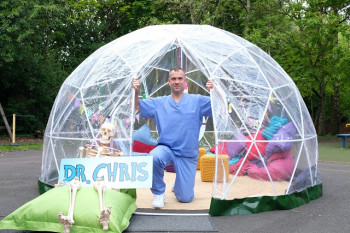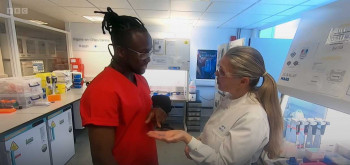News
Hazel Screen on BBC TV's Operation Ouch! talking about organ-chips
Centre for Bioengineering23 January 2024
Professor Hazel Screen of the Centre for Bioengineering recently took on a new challenge: explaining the fascinating world of organ-chips technology to the young audience of CBBC Operation Ouch!
You can watch on the BBC iplayer the episode which was filmed in our Organ-Chip Centre: https://www.bbc.co.uk/iplayer/episode/m001vn44/operation-ouch-series-12-10-ask-us-anything
In this Q&A, we delve into Professor Screen's research, her experience on the show, and why organ-chips hold so much promise for the future of medicine.
Briefly introduce yourself and your role at QMUL
My name is Hazel Screen. I'm a Professor of Biomedical Engineering in the School of Engineering and Materials Science. I have a really strong interest in how as an engineer, I can develop innovative new in vitro models, and in driving their use in both discovery science and towards developing new medicines.
Because of this, I co-direct our Centre for Predictive in vitro Models with my colleague Proffesor Martin Knight, bringing together our strong research community in the area. We also co-direct the QM+Emulate Organ-on-Chips Centre, which is a centre of excellence in organ-chip technology. Finally, I led the UK Organ-on-a-Chip Technologies Network for 4 years, bringing together the UK community with an interest in organ-chips and helping us to work together to make this new bioengineering technology a success.
What does your primary work and research focus on?
I'm interested in developing new models and approaches to understand how our organs function in health, how and why they get diseased, and changes which occur with age. I have a particular interest in the tissues in our musculoskeletal systems, such as tendon, muscle, bone and cartilage.
We know all these tissues are subjected to high loads as we use our bodies, and these loads are necessary for healthy maintenance of the tissue but can also drive disease. I work to develop models in which I can mimic the environment of an organ and recreate the loads in the body, to better understand how and why this occurs and how we can treat or prevent the disease changes. The name for the type of small in vitro model I am interested in developing is 'organ-chip'.
How did you feel when you were asked to be on Operation Ouch?
It was really exciting! I have helped with a previous episode where the Operation Ouch team wanted to show how strong tendon is. We ran an experiment, hanging a car from a tendon, and all the QM team really enjoyed getting involved. I was excited that for the new series, Operation Ouch wanted to showcase organ-chip technology.
Organ-chip is a comparatively new technology, growing very rapidly at the moment, and offering huge potential for improving how we discover and develop new medicines. I've really enjoyed being part of such cutting-edge science and it's wonderful to have an opportunity to share my enthusiasm for organ-chip with others.
Operation Ouch is a children's show, introducing children to medical science. How did you approach explaining something complex like organ chip technology, for a young audience?
I have an eight-year-old daughter, and we watch Operation Ouch a lot at home. Not only did that make it even more exciting to be involved in the show, but it also meant I'm used to talking about science with young children and hearing how other topics are described on Operation Ouch in an accessible manner. It can be easy to get caught up in the complexity when this requires explaining what the basic principles are about.
What was it like filming for the show? What was the most fun part? Did anything particularly funny or interesting happen?
It was an enjoyable day. It took some time, filming things from different angles and thinking about how to make it funny, but it was relaxed and fun working together. It was amusing at the end. I hadn't realised Dan was going to pretend the chip was talking then walk off for fish and chips, so we did rather make up the ending on the fly!
Do you think that TV shows like this are important? Why?
Operation Ouch is such a fantastic show. Not only does it help children improve their understanding of science and medicine and make learning these topics immense fun, but it also showcases people working in these areas and helps make future STEM careers accessible and exciting opportunities. I hope we might capture the imagination of some children with organ-chip science and bring them a step nearer to a future STEM career!
Summarise in one sentence why people should be interested in organ chip technology.
Organ-chips have the potential to offer a new, more accurate approach to exploring and testing new drugs and medicines. They have the potential to completely reshape drug discovery, to improve our ability to develop new treatments and make healthcare more equitable for all.
Email: h.r.c.screen@qmul.ac.uk
Updated by: Martin Knight






